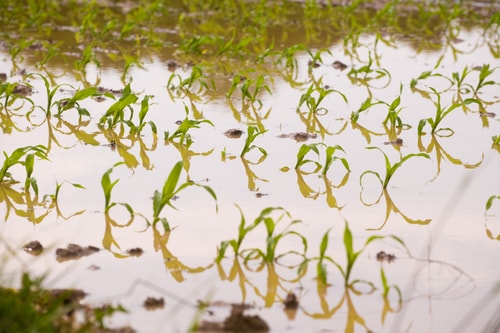Economic impact estimated at $300 million
By Diego Flammini, Farms.com
Heavy rains and flooding in Indiana that’s left some cities and towns without power and underwater, is also expected to have a major economic impact on the state’s crops.
Some agriculture experts have estimated that the severe weather has already cut Indiana’s corn and soybean crop by $300 million, with the possibility of more damage if the wet weather continues.

Northern Indiana is seeing the worst of the rains and flooding, experiencing at least a foot of rain during June. Only four days of June in Indiana have been without rain.
Chris Hurt, an agricultural economist from Purdue University told the American Press that the damage this year will still fall short of what Indiana went through during the 2012 drought, when approximately $1.5 billion in crop insurance was paid out.
According to Hurt, the rains have taken Indiana’s projected corn harvest numbers from possible historic yields to the bottom third.
Current weather for the Indianapolis area shows more rain and thunderstorms throughout the week, and is currently under a flood warning. It looks like some relief could come on Tuesday, July 7th as the forecast is mostly sunny with a high of 82°F.
For more information on the state of crops in Indiana and throughout the United States Corn Belt, be sure to follow Farms.com Chief Commodity Strategist Moe Agostino on his 12-state Corn Belt Crop Tour.
Are you a corn and soybean farmer in Indiana? If so, tell us the measures you’ve been taking to try and minimize the potential damages from the flooding. How has it impacted other areas of your farming operations?